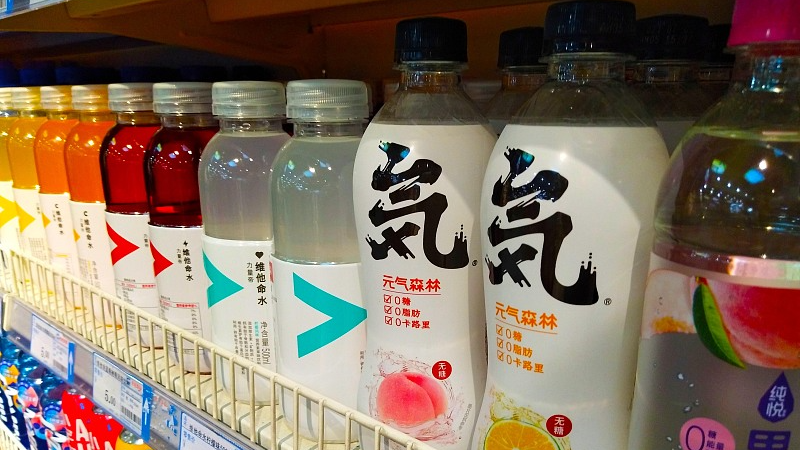China’s State Council issued a directive earlier this month aimed at accelerating the integrated development of domestic and foreign trade. The directive underscores China’s commitment to bolstering the global presence of its brands, with a focus on expanding the international reach of traditional and established brands while enhancing the global competitiveness of consumer ones.
Recent years have witnessed consistent growth in global markets. This has instilled confidence in China’s consumer brands, especially in the catering and food sectors, to further extend their reach overseas. According to an Ipsos research commissioned by Google, from 2018 to 2021 recognition of Chinese brands in overseas markets increased by 4.9 percent, with a 1.4 percent rise in purchase intention. This reflects a shift from “made in China” to “brands in China.”
Consumers lining up outside U.S. HEYTEA. /CGTN
Consumers lining up outside U.S. HEYTEA. /CGTN
One notable example is HEYTEA, the originator of Chinese new-style tea, which recently announced its official entry into the U.S. market with a presence in Times Square, New York City. With over 3,000 stores in China and a significant presence in Asia, HEYTEA is now looking to introduce genuine, high-quality Chinese new-style tea to American consumers.
Like many other new Chinese consumer brands, it is introducing a new catering experience to international customers and seeking more market opportunities to develop additional streams of revenue.

Consumers waiting for their orders in-store U.S. HEYTEA. /CGTN
Consumers waiting for their orders in-store U.S. HEYTEA. /CGTN
“Our goal is to drive an upgrade in the product landscape and continuously expand the space within the American tea drinks market,” said Yujia Gu, vice president of Strategy at HEYTEA.
HEYTEA launched its first overseas store in Singapore in 2018, with over 3,000 cups of tea sold every day during the opening period. While the company has previously entered global markets, including the United Kingdom, Australia, and Canada, the U.S. offers a multitude of new opportunities.

Chinese beverage brand Chi Forest (Yuanqi Senlin). /CFP
Chinese beverage brand Chi Forest (Yuanqi Senlin). /CFP
The Shenzhen-based firm is not alone in venturing abroad. This year, its counterpart Naixue opened an outlet in Thailand, while peer brand ChaPanda entered the Republic of Korea.
More Chinese consumer brands are increasingly ambitious in seeking business opportunities globally. In a speedy expansion of its overseas footprint, Chinese beverage brand Chi Forest has made a significant entry into the Indonesian market. Its products are now available in over 30,000 Indomaret and Alfamart stores, Indonesia’s two largest convenience store chains.
The tea franchise, WeDrink, also entered the Southeast Asian market last year with a strikingly quick expansion. It already established 60 stores in Indonesia as of February this year.
Chinese coffee disrupter, Cotti Coffee, celebrated the opening of its first store in Jakarta, Indonesia, this August, signaling the coffee brand’s aggressive expansion plans in the country. Reports indicate that Cotti Coffee aims to open 400 stores in Indonesia this year.
“The brands’ success domestically and internationally showcases the improvements in brand images and their market strategies,” Gao Yanmin, a former official from the Ministry of Industry and Information Technology, said at the 2023 Boao Forum for Entrepreneurs.
(Cover via CFP)




